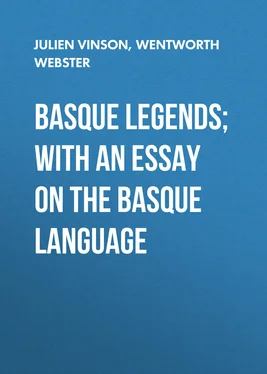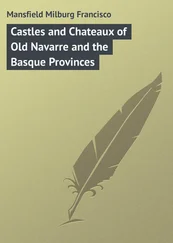Julien Vinson - Basque Legends; With an Essay on the Basque Language
Здесь есть возможность читать онлайн «Julien Vinson - Basque Legends; With an Essay on the Basque Language» — ознакомительный отрывок электронной книги совершенно бесплатно, а после прочтения отрывка купить полную версию. В некоторых случаях можно слушать аудио, скачать через торрент в формате fb2 и присутствует краткое содержание. Жанр: foreign_antique, Старинная литература, Мифы. Легенды. Эпос, на английском языке. Описание произведения, (предисловие) а так же отзывы посетителей доступны на портале библиотеки ЛибКат.
- Название:Basque Legends; With an Essay on the Basque Language
- Автор:
- Жанр:
- Год:неизвестен
- ISBN:нет данных
- Рейтинг книги:3 / 5. Голосов: 1
-
Избранное:Добавить в избранное
- Отзывы:
-
Ваша оценка:
- 60
- 1
- 2
- 3
- 4
- 5
Basque Legends; With an Essay on the Basque Language: краткое содержание, описание и аннотация
Предлагаем к чтению аннотацию, описание, краткое содержание или предисловие (зависит от того, что написал сам автор книги «Basque Legends; With an Essay on the Basque Language»). Если вы не нашли необходимую информацию о книге — напишите в комментариях, мы постараемся отыскать её.
Basque Legends; With an Essay on the Basque Language — читать онлайн ознакомительный отрывок
Ниже представлен текст книги, разбитый по страницам. Система сохранения места последней прочитанной страницы, позволяет с удобством читать онлайн бесплатно книгу «Basque Legends; With an Essay on the Basque Language», без необходимости каждый раз заново искать на чём Вы остановились. Поставьте закладку, и сможете в любой момент перейти на страницу, на которой закончили чтение.
Интервал:
Закладка:
“Yes, yes, he was running fast, and in order to go faster just here he stabbed himself, and threw away his bowels, and still he went on all the faster.”
The Tartaro, too, in order to go faster, thrusts his knife into his body, and falls stark dead. 16 16 For this incident compare the death of the giant in one of the versions of “Jack the Giant-Killer;” and especially “the Erse version of Jack the Giant-Killer.” Campbell, Vol. II., p. 327.
The madman goes to his master’s. Near the house there was a marsh quite full of mud. He puts his live pig into it, and all the tails too. He enters the house, and says to the master that he is there with his pigs. The master is astounded to see him.
He asks him, “Where are the pigs, then?”
He says to him, “They have gone into the mud, they were so tired.”
Both go out, and begin to get the real pig out, and between the two they pull it out very well. They try to do the same thing with the others; but they kept pulling out nothing but tails.
The madman says, “You see how fat they are; that is why the tails come out alone.”
He sends the servant to fetch the spade and the hoe. Instead of bringing them he begins to beat the mistress, whack! whack! and he cries to the master, “One or both?”
The master says to him, “Both, both.”
And then he beats the servant maid almost to pieces. He goes then to the master, taking with him the spade and the hoe, and he sets to beating him with the spade and the hoe, until he can no longer defend himself, and then he thrashes the skin off his back, and takes his pig and goes off home to his father and mother; and as he lived well he died well too.
Pierre Bertrand
learnt it from his Grandmother, who died a few years since, aged 82.
Variations of Errua
We have several variations of this tale, some like the above, very similar to Grimm’s “Valiant Little Tailor,” others like Campbell’s “Highland Tales.” In one tale there are two brothers, an idiot and a fool (Enuchenta eta Ergela). The idiot goes out to service first, and gets sent back for his stupidity. Then the fool goes, and outwits both his master and the Tartaro, whose eye he burns out with a red-hot spit, as in the first instance. In another the servant frightens the Tartaro at the outset by cracking two walnuts, and saying that they were bones of Christians he was cracking. Another wager is as to which shall carry most water from a fountain. The Tartaro fills two hogsheads to carry, but the lad says to him, “Only that; I will take the whole fountain;” and he begins to stir the water about with a stick. But the Tartaro cries out, “No! No! No! I give up. Where shall I go and drink if you carry away all my water?” Another variation is as follows:—
The Three Brothers, the Cruel Master, and the Tartaro
Like many others in the world, there lived a mother with her three sons. They were not rich, but lived by their work. The eldest son said one day to his mother—
“It would be better for us if I should go out to service.”
The mother did not like it, but at last she let him go. He goes off, far, far, far away, and comes to a house, and asks if they want a servant. They say “Yes,” and they make their agreement.
The master was to give a very high salary—100,000 francs—but the servant was to do everything that the master ordered him, and, if he did not do it, the master was to tear the skin off his back at the end of the year, and to dismiss him without pay. 17 17 This agreement is found also in the Norse and in Brittany. See “Contes Populaires de la Grande Bretagne,” by Loys Brueyre, pp. 25, 26. This is an excellent work. The incident of Shylock, in the “Merchant of Venice,” will occur to every one.
The servant said to him,
“All right; I am strong, and I will work.”
On the morrow the master gives him a great deal of work, but he does it easily. The last months of the year the master presses him much more, and one day he sends him into a field to sow fourteen bushels of wheat in the day. The lad goes sadly, taking with him a pair of oxen. He returns to the house very late in the evening. The master says to him,
“Have you done your work?”
He says, “No.”
“Do you remember the agreement we made? I must tear the skin off your back: that is your salary.”
He tears the skin off, as he had said, and sends him away home without anything. His mother was in great grief at seeing him come home so thin and weak, and without any money.
He tells what has happened, and the second brother wishes to start off at once, saying that he is strong, and that he will do more work. The mother did not like it, but she was obliged to let him go.
He goes to the same house as his brother, and makes the same terms with the master. When he had almost finished his year, his master sends him too to sow fourteen bushels of wheat. He starts very early in the morning, with two pair of oxen; but the night came before he had sown it all. The master was very glad at the sight of that. He strips his skin off his back also, and sends him away without any money. Think of the vexation of this mother in seeing both her sons return in this fashion.
The third wishes to start off at once. He assures his mother that he will bring back both the money and the skin of his back. He goes to this same gentleman. He tells this one, too, that he will give him a high salary, on condition that he will do all that he shall tell him to do, otherwise he shall have the skin torn off his back, and be sent away without anything, at the end of the year.
He had made him work hard and well for ten months, and then wished to try him. He sent him to the field, and told him to sow fourteen bushels of wheat before night. He answers, “Yes.”
He takes two pairs of oxen, and goes off to the field. He ploughs a furrow all round the field, and throws his fourteen bushels of wheat into it. He then makes another furrow, to cover it up, and at night time he goes home to the house. The master is astonished. He asks him if he has sown it.
“Yes, it is all under ground; you may be sure of it.”
The master was not pleased; he had his fears.
The next day he sends him with sixteen head of cattle to such a field, and says to him,
“You must take all these cattle into the field without unlocking the gate or making a gap.”
Our lad takes a hatchet, a hoe, and a fork. Off he goes, and when he gets to the field he kills them all, one by one. He cuts them up with the hatchet, and throws them with the fork into the field.
He comes home at nightfall, and says to his master that all the cattle are in the field as he had told him. The master was not pleased, but he said nothing.
The next day he told him to go to such a forest and to bring a load of wood from there, but all the sticks quite, quite straight. Our lad goes off and cuts down in the chestnut copse all the young chestnut trees which his master had planted, and which were very fine ones; and he comes home. When the master saw that, he was not pleased, and said to him,
“To-morrow you shall go again with the oxen; and you must bring a load of wood quite crooked, all quite crooked; if you bring only one straight, so much the worse for you.”
The lad goes off, and pulls up a fine vineyard. After he had loaded his cart, he comes home. When the master saw that, he could not say anything; but he did not know what to think of it.
He sends him into a forest. There was a Tartaro there; and all the persons, and all the animals who went there, he ate them all. The master gives him ten pigs, and also food for ten days, telling him that the hogs would fatten themselves well there, because there were plenty of acorns, and that he must return at the end of ten days.
Читать дальшеИнтервал:
Закладка:
Похожие книги на «Basque Legends; With an Essay on the Basque Language»
Представляем Вашему вниманию похожие книги на «Basque Legends; With an Essay on the Basque Language» списком для выбора. Мы отобрали схожую по названию и смыслу литературу в надежде предоставить читателям больше вариантов отыскать новые, интересные, ещё непрочитанные произведения.
Обсуждение, отзывы о книге «Basque Legends; With an Essay on the Basque Language» и просто собственные мнения читателей. Оставьте ваши комментарии, напишите, что Вы думаете о произведении, его смысле или главных героях. Укажите что конкретно понравилось, а что нет, и почему Вы так считаете.












